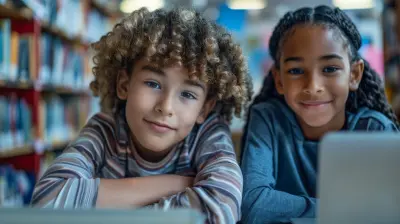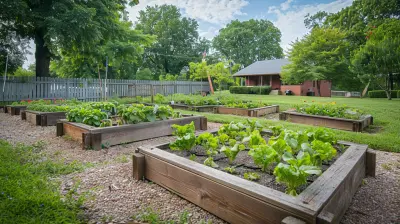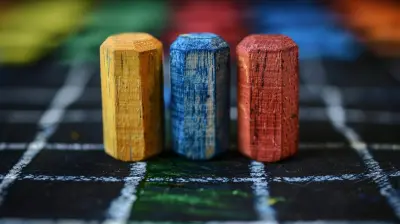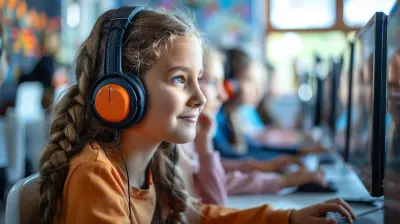The Importance of Building Relationships for Student Engagement
5 February 2025
When it comes to education, we often focus on the curriculum, teaching methods, and standardized testing. But there’s something more subtle, yet equally powerful, that plays a significant role in student success: relationships. Yep, you heard that right. Building strong, meaningful relationships between students and educators can be the secret sauce to improved engagement, motivation, and overall academic performance.
But why is this so important? And how exactly do relationships influence student engagement? Let’s dive deep into this topic and find out why fostering connections in the classroom is the key to unlocking a student’s full potential.

Why Relationships Matter in the Classroom
Let’s face it—school can be tough. Between the pressures of exams, peer dynamics, and the general stress of growing up, students have a lot on their plates. Amid all this, a teacher who takes the time to build a positive and supportive relationship with their students can be a game-changer.Think about it. When someone believes in us, we’re more likely to believe in ourselves, right? The same goes for students. When teachers genuinely care about their students' well-being and progress, it creates a ripple effect that influences how students engage with their learning.
The Power of Trust
Trust is the foundation of any healthy relationship, and the teacher-student dynamic is no different. When students trust their teachers, they feel safe to ask questions, make mistakes, and take intellectual risks. This kind of environment fosters active learning, allowing students to feel more comfortable participating in discussions, sharing ideas, and collaborating with peers.On the flip side, a lack of trust can create a climate of fear and disengagement. Students who don’t trust their teachers may be reluctant to seek help or even attend class, leading to poor performance and a general lack of interest in their education.
Emotional Support and Student Well-Being
Students are not just academic machines; they are human beings with emotional needs. Teachers who acknowledge this and provide emotional support can have a profound impact on their students' mental and emotional well-being. Whether it’s offering a listening ear, showing empathy during tough times, or simply being a consistent and supportive presence, these small acts can make a world of difference.Research shows that students who feel emotionally supported by their teachers tend to have better academic outcomes, higher levels of motivation, and improved engagement in the classroom. It’s no surprise, then, that strong teacher-student relationships are often linked to lower dropout rates and higher graduation rates.

How Relationships Drive Engagement
Okay, so we’ve established that relationships are important. But how exactly do they drive student engagement? Let’s break it down.Fostering a Sense of Belonging
One of the primary ways relationships enhance student engagement is by fostering a sense of belonging. Students who feel connected to their teachers and peers are more likely to feel like they belong in the classroom. This sense of belonging can be a powerful motivator, encouraging students to actively participate in class activities, stay focused on their studies, and take pride in their work.When students feel alienated or disconnected, they’re more likely to disengage, skip class, or lose interest in their education altogether. A simple “How are you?” or “You did great today!” from a teacher can be enough to make a student feel seen and valued, which in turn boosts their motivation to engage in their learning.
Encouraging Active Participation
A classroom where students feel comfortable is a classroom where students are more likely to participate. When teachers build strong relationships with their students, they create an environment that encourages curiosity, collaboration, and discussion. Students who feel connected to their teachers are less likely to fear being wrong or asking “stupid questions,” which are often the moments where the most learning happens.Moreover, when teachers show interest in their students' lives and personal stories, it helps to frame lessons in a way that resonates with them on a deeper level. This personalized approach can make learning more relatable and engaging, leading to higher levels of participation.
Personalized Learning
Every student is different. They have unique strengths, weaknesses, learning styles, and interests. When teachers take the time to build relationships with their students, they can better understand these individual differences and tailor their teaching strategies accordingly. This is known as personalized learning, and it’s a fantastic way to keep students engaged.For example, a teacher who knows that one of their students is passionate about sports might incorporate examples from basketball or soccer into their math lessons. Or, a teacher who knows that a student struggles with anxiety might provide extra reassurance and support during stressful times, like exam season. These personalized touches can significantly increase a student’s engagement, as they feel that their individual needs and interests are being recognized and valued.

Building Relationships in a Digital World
In today’s digital age, building relationships with students may look a little different than it did in the past. With the rise of online learning platforms, virtual classrooms, and digital communication tools, the way we connect with students has evolved. But that doesn’t mean relationships are any less important—in fact, they may be more crucial than ever.The Challenges of Online Learning
One of the biggest challenges of online learning is the lack of face-to-face interaction. Without the physical presence of a teacher in the classroom, it can be more difficult to build trust and rapport with students. Additionally, students may feel isolated or disconnected from their peers, which can lead to disengagement and a lack of motivation.However, despite these challenges, it is still possible to cultivate strong relationships in an online learning environment. It just requires a bit more creativity and intentionality.
Strategies for Building Relationships Online
So, how do you build meaningful relationships with students in a virtual classroom? Here are a few strategies that can help:1. Regular Check-Ins: Make a habit of checking in with your students regularly. This could be through emails, video calls, or even a quick message in the chat. Ask them how they’re doing, if they’re struggling with anything, or if they need any extra support. These small gestures can go a long way in making students feel cared for and supported.
2. Personalized Feedback: When grading assignments or providing feedback, take the time to make your comments personal and specific. Instead of just saying “Good job,” try something like, “I really liked how you explained your reasoning in this section—great work!” This shows students that you’re paying attention and valuing their efforts.
3. Create Opportunities for Interaction: Encourage students to interact with one another through group projects, discussion boards, or breakout rooms during live sessions. The more students feel connected to their peers, the more engaged they’ll be in the learning process.
4. Be Accessible: Let your students know that you’re available if they need help or just want to talk. Having open office hours or setting up one-on-one meetings can make a big difference in making students feel supported, even in a virtual environment.

The Role of Peers in Student Engagement
While the teacher-student relationship is incredibly important, we can’t forget about the role that peer relationships play in student engagement. Friendships and peer connections can have a significant impact on how students feel about school and their motivation to succeed.Positive Peer Influence
When students have positive relationships with their classmates, they’re more likely to enjoy coming to school and participating in class activities. Friendships can provide emotional support, encouragement, and a sense of belonging, all of which contribute to greater engagement in the classroom.Moreover, positive peer influence can encourage students to adopt good study habits, stay focused on their academic goals, and take their education more seriously. On the flip side, negative peer relationships—such as bullying or exclusion—can lead to disengagement, anxiety, and poor academic performance.
Group Work and Collaboration
Encouraging group work and collaboration is a great way to foster positive peer relationships and increase student engagement. When students work together on projects, they have the opportunity to learn from one another, share ideas, and build meaningful connections. This not only enhances their learning experience but also creates a sense of community within the classroom.However, it’s important to be mindful of group dynamics. Teachers should ensure that all students feel included and that group work is structured in a way that allows everyone to contribute.
The Long-Term Benefits of Building Relationships
Building strong relationships in the classroom doesn’t just benefit students in the short term—it can have lasting effects on their academic and personal development. Students who experience positive relationships with their teachers are more likely to develop a love for learning, a growth mindset, and a sense of confidence in their abilities.These skills and attitudes can carry over into higher education and beyond, shaping students into lifelong learners who are motivated to pursue their goals and achieve success.
Conclusion
At the end of the day, education is not just about transmitting information—it’s about connecting with students on a human level. Building strong relationships in the classroom is essential for fostering student engagement, enhancing motivation, and creating a positive learning environment. Whether in a physical or virtual classroom, taking the time to get to know your students and show them that you care can make all the difference in their academic journey.Remember, the best teachers aren’t just educators—they’re mentors, supporters, and role models. And when students feel connected to their teachers and peers, they’re more likely to stay engaged, motivated, and excited about learning.
all images in this post were generated using AI tools
Category:
Student EngagementAuthor:

Zoe McKay
Discussion
rate this article
17 comments
Vanessa Klein
This article beautifully highlights the critical role of relationships in fostering student engagement. Building strong connections not only enhances learning experiences but also creates a positive classroom environment. Let's continue to prioritize these relationships, as they are the foundation for student success and motivation. Great insights!
March 31, 2025 at 7:11 PM

Zoe McKay
Thank you for your thoughtful comment! I completely agree—strong relationships are essential for fostering engagement and creating a thriving classroom environment. Your support encourages further exploration of this vital topic!
Rivenheart Becker
Building authentic relationships is non-negotiable for student engagement. It’s not just about academics; it’s about connection. When educators prioritize relationships, students feel valued and invested, transforming classrooms into vibrant spaces of motivation and collaboration. Let’s make it happen!
March 27, 2025 at 3:50 AM

Zoe McKay
Absolutely! Building authentic relationships is crucial for fostering student engagement and motivation. When students feel connected, they thrive both academically and personally. Let's prioritize these connections!
Fatima Barker
Thank you for this insightful article! Building genuine relationships truly transforms the learning experience. Engaging students through connection fosters a supportive environment where they feel valued and motivated to thrive.
March 21, 2025 at 9:36 PM

Zoe McKay
Thank you for your thoughtful comment! I'm glad you found the article insightful. Building genuine relationships is indeed vital for creating a supportive learning environment.
Zayden McAllister
Great insights! Building relationships truly enhances student engagement and creates a positive learning environment.
March 9, 2025 at 11:49 AM

Zoe McKay
Thank you! I completely agree—strong relationships are key to fostering engagement and a thriving classroom atmosphere.
Amalia Walker
Building relationships isn't just nice—it's essential! Ditch the textbook tactics and get real with your students!
February 27, 2025 at 1:56 PM

Zoe McKay
Absolutely! Genuine connections foster trust and engagement, leading to a more dynamic learning environment. Thank you for highlighting this vital aspect!
Indie Allen
Building strong relationships in the classroom fosters a sense of belonging, significantly enhancing student engagement. When students feel valued and understood, they are more likely to participate actively, collaborate with peers, and take ownership of their learning experiences.
February 26, 2025 at 3:55 AM

Zoe McKay
Absolutely! Strong relationships are foundational to creating an inclusive environment where students feel valued, leading to increased participation and ownership of their learning. Thank you for highlighting this crucial aspect!
Henry Warner
Building strong relationships is crucial for fostering student engagement. When students feel connected, they thrive academically and socially, leading to a vibrant and dynamic learning environment.
February 24, 2025 at 1:15 PM

Zoe McKay
Thank you for your insightful comment! I completely agree—strong relationships are foundational to student success and create an enriching educational experience.
Nolan McKeehan
Building relationships in education transcends mere interaction; it fosters a sense of belonging and trust that empowers students to engage deeply with learning. When students feel valued and understood, they are more likely to invest in their education, leading to transformative outcomes.
February 23, 2025 at 11:22 AM

Zoe McKay
Thank you for your insightful comment! I completely agree—building strong relationships in education is crucial for fostering a sense of belonging, which enhances student engagement and leads to transformative learning experiences.
Sasha Price
Building strong relationships enhances student engagement and fosters a positive learning environment.
February 17, 2025 at 12:43 PM

Zoe McKay
Absolutely! Building strong relationships is essential for maximizing student engagement and creating a supportive learning atmosphere.
Sierra Kirkpatrick
This article beautifully highlights the crucial role relationships play in fostering student engagement. By prioritizing connections between educators and students, we can create a supportive learning environment that encourages curiosity and growth. Thank you for shedding light on this vital aspect of education—it's a reminder for all of us to invest in meaningful interactions!
February 17, 2025 at 4:22 AM

Zoe McKay
Thank you for your thoughtful comment! I'm glad you found the article's focus on relationships resonant. Strong connections are indeed essential for fostering a vibrant learning environment.
Kiera Burton
Building strong relationships fosters trust and collaboration, igniting student engagement and inspiring a love for learning. Let's cultivate connections that empower every learner to thrive!
February 16, 2025 at 8:37 PM

Zoe McKay
Thank you for highlighting the pivotal role of relationships in education! Strong connections truly drive engagement and inspire lifelong learners. Let’s continue to prioritize these bonds for student success!
Makayla Wood
Ever wondered what truly ignites a student’s passion? It's not just lessons; it's the connections that spark curiosity. Delve into the unseen threads that weave engagement and success in education.
February 15, 2025 at 3:54 AM

Zoe McKay
Absolutely! Building strong relationships fosters curiosity and engagement, creating a foundation for deeper learning and student success.
Astraea Good
Building strong relationships fosters trust and connection, significantly enhancing student engagement and creating a positive learning environment.
February 14, 2025 at 11:58 AM

Zoe McKay
Thank you for your insight! I completely agree—strong relationships are fundamental to fostering trust and enhancing student engagement in the learning environment.
Melody McHugh
Building relationships is fundamental for fostering genuine student engagement. When students feel connected and valued, their motivation and willingness to participate soar. Creating a supportive environment is essential for academic success and personal growth.
February 13, 2025 at 4:45 AM

Zoe McKay
Thank you for highlighting the crucial role of relationships in student engagement! I completely agree that a supportive environment enhances both motivation and academic success.
Jamie Harris
Building relationships in education is like watering a plant—ignore it, and it’ll wilt faster than a forgotten lunch in a locker! Engaged students are like thriving plants; give them a little love, attention, and maybe some snacks, and watch them bloom. Who knew the secret ingredient was friendship and a bit of chocolate?
February 12, 2025 at 7:36 PM

Zoe McKay
Absolutely! Just like plants, students need care and connection to flourish. Your analogy highlights the vital role of nurturing relationships in fostering engagement. Love, attention, and a little treat go a long way in creating a thriving learning environment!
Tristan Warner
Great article! Building relationships in the classroom really makes a difference. When students feel connected, they're more likely to engage and participate. It's all about creating a supportive environment where everyone feels valued. Let’s prioritize those connections for a more dynamic learning experience!
February 11, 2025 at 9:38 PM

Zoe McKay
Thank you for your thoughtful comment! I completely agree—building strong relationships is key to fostering engagement and creating a positive learning environment.
Mabel McMillan
Building relationships in educational settings is crucial for enhancing student engagement. Strong connections between educators and students foster trust, encourage open communication, and create a supportive learning environment, ultimately leading to improved academic performance and a sense of belonging. Engaged students are more motivated to succeed.
February 7, 2025 at 4:48 AM

Zoe McKay
Thank you for highlighting the importance of relationships in education! I completely agree—strong connections truly enhance student engagement and contribute significantly to academic success.
MORE POSTS

How to Use Exit Tickets for Instant Formative Feedback

How to Design an Effective Professional Learning Community

The Role of Peer-to-Peer Learning in Virtual Classrooms

School Gardens: Growing More Than Just Plants

How to Foster Creativity in Students Using Digital Design Tools

Using Rubrics for Consistent and Transparent Formative Feedback

Increasing Student Motivation in Virtual Learning Settings

How to Identify Giftedness in Early Childhood

The Role of Parents in Supporting Literacy Development

How to Build Rapport Quickly in Conversations

Cultivating Leadership Skills Through Peer Tutoring